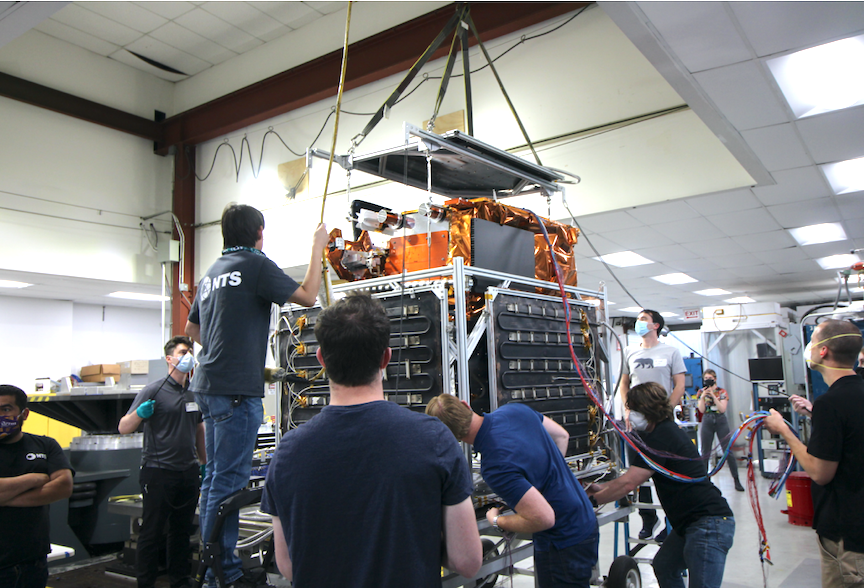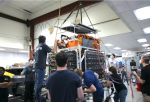
Alaska will benefit from the efforts of Astranis’ MicroGEO line of small communication satellites, as a result of successful thermal-vacuum testing of a qualification vehicle. This important test furthers the company’s ability to develop technology to operate in the harsh environment of space and marks a major milestone on the path to delivering low-cost broadband internet to underserved populations around the world, starting with Astranis’s first commercial satellite that will provide broadband internet in Alaska.
A qualification vehicle test accomplishes two things.
- First, it allows the engineering team to characterize the thermal behavior of the vehicle.
- Second, it pushes the vehicle to significantly higher levels than it will expect to see on orbit to ensure the vehicle can continue to operate.
Astranis succeeded on both counts. Astranis made use of a highly-specialized vacuum chamber at an NTS Space center-of-excellence facility in Los Angeles, California. This thermal-vacuum chamber, paired with a custom-designed shroud, was able to simulate both extreme hot and cold temperatures needed for qualification testing. The chamber was pumped down to near vacuum, and Astranis engineers then powered up the vehicle, ran through a series of functionality checks, and began to operate the vehicle as the test environment was adjusted across a wide range of temperatures. The spacecraft was exposed to pressures as low as 7 x 10-6 Torr (about one one-hundred-millionth the density of Earth’s atmosphere).
“This is the single largest technical de-risking milestone for this product and for our first commercial program,” said Astranis CEO John Gedmark. “To get to this point, all the different aspects of the vehicle had to come together and work as a system—avionics, power electronics, the payload, the structure, the software, and more. Then we really pushed it to the limits. The fact that we passed this test with flying colors speaks volumes to the dedication and talent of our team. And it brings us one step closer to helping hundreds of thousands of Alaskans gain reliable access to broadband internet.”
After the success of this test, the Astranis team will complete a final wave of system-level and unit-level tests before commencing with the build of the first MicroGEO flight vehicle.
Astranis will ship its first commercial satellite early next year for a mission to provide broadband internet to the State of Alaska, with service beginning in summer 2021. The company has signed a contract to launch the satellite on a SpaceX rocket from Cape Canaveral, Florida. Astranis is partnering with Pacific Dataport Inc., a subsidiary of Microcom, Alaska’s largest satellite TV and internet provider, to deliver affordable broadband internet to Alaska, and this new satellite will more than triple the satellite bandwidth serving the state.
“We have to turn away customers every day who want more bandwidth,” says Chuck Schumann, CEO of Pacific Dataport Inc. “This first satellite from Astranis will enable Alaskans living in remote locations to get reliable access to the internet for the first time, and will reduce internet prices across the state. The success of this qualification TVAC test shows that Astranis and Microcom can deliver on their promise to the people of Alaska.”

